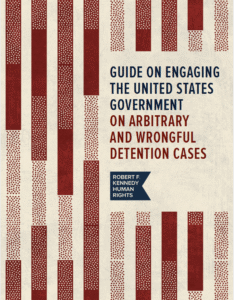Freedom of the press is a key component of strong and open civic space, which facilitates citizens’ ability to freely voice dissent, organize, and defend human rights. Journalists’ role in exposing corruption, impunity, and criminal activity also makes them targets to be silenced. As a result, many are forced to self-censor to avoid violence, infringing not only their individual right to freedom of expression but also society’s collective ability to be informed about and expose human rights violations, as well as to demand that those responsible be held accountable.
Violence against journalists is an alarming problem worldwide. In Latin America, this problem is particularly acute in more remote areas, which are often neglected by politicians and government authorities and where corruption and impunity are rampant. The Inter-American Commission on Human Rights – through its Special Rapporteurship on Freedom of Expression – documented the murder of 131 journalists in Latin America between 2011 and 2015, of which 124 occurred in places far from major urban centers. This trend is seen throughout the region: in countries like Colombia, Guatemala, Honduras, Paraguay, and Brazil. In México, at least six journalists were murdered for their work in 2017, making it the third most dangerous country for journalists in world in 2017 after Syria and Iraq.
Robert F. Kennedy Human Rights and the Inter-American Press Association’s (IAPA) recent case before the Inter-American Court of Human Rights offers an opportunity to challenge these trends. In 1998, Nelson Carvajal, a Colombian journalist was shot and killed by an unknown assailant as he was leaving a local school in Pitalito, Huila Province. Carvajal was well-known for exposing local corruption. He was the editor of the news channel Noticiero Momento Regional and host and editor of multiple radio magazines and programs. Colombian authorities’ investigation into his murder has been plagued with irregularities and gross negligence and, two decades later, no one has been held accountable for his death. Carvajal’s case is the first case of a murdered journalist to be heard by the Inter-American Court of Human Rights. Along with IAPA, we requested that the Court require States to use a higher standard of due diligence in investigating and prosecuting killings of journalists, recognizing the critical role of freedom of expression and the press in every society. We expect the Court’s ruling in the coming days.
Media freedom in many parts of Africa is also severely restricted. In Egypt — one of the top jailers of journalists in the world — another Robert F. Kennedy Human Rights client, Mahmoud Hussein, remains behind bars to this day after almost a year and a half in detention. Hussein is a prominent Al Jazeera journalist and his ongoing detention is emblematic of the Egyptian government’s widespread practice of punitive pre-trial detention, which severely stifles freedom of expression and freedom of the press. Hussein was accused of “broadcasting fake news” and arbitrarily detained in December 2016 upon returning to Egypt for a family visit. After several brutal months in solitary confinement, Hussein was transferred to the notorious Tora Prison known for its poor conditions and mistreatment of detainees. In February 2016, the United Nations Working Group on Arbitrary Detention (UNWGAD) decided — based on a petition submitted by Robert F. Kennedy Human Rights — that Hussein’s detention was arbitrary and that he had been targeted because of his status as a journalist working for Al Jazeera. We continue to advocate for his release, alongside the Committee to Protect Journalists, Reporters Without Borders, and others. Despite these efforts, in late April, an Egyptian court again renewed his detention.
In Western Sahara, media activist Mohamed Al-Bambary remains detained after being convicted at a flawed trial on fabricated charges. Al-Bambary works with Equipe Media, the most important independent media organization in Western Sahara. His job was to attend protests and public rallies to film as Moroccan security forces violently dispersed peaceful assemblies. To silence Al-Bambary, he was arrested in 2015 when he went to a police station to renew his identity card. Although he was interrogated about his media activism, he was eventually charged for participating in a violent riot that took place several years prior and resulted in several deaths. Although virtually no evidence was presented at trial, Al-Bambary eventually received a sentence of six years. In a petition to the UNWGAD submitted by Robert F. Kennedy Human Rights and Freedom Now, we argue that his detention is arbitrary both because of the way he was initially arrested and detained, and because of the multiple ways in which his trial failed to the meet international standards of due process. As we wait for a decision in this case, Al-Bambary’s family has been refused visitation and there have been reports that he has been tortured and placed in solitary confinement.
On World Freedom of the Press Day, we recommit ourselves to defending the rights and security of journalists, who are essential to maintaining civic space and promoting good governance. We will continue to partner with leading organizations to raise awareness on the particular threats that members of the press face for their work and to challenge the impunity that perpetuates this violence through strategic litigation.




